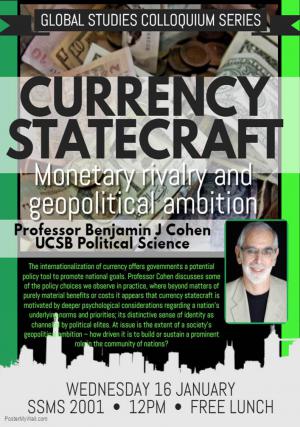Event Date:
Benjamin Cohen, Currency Statecraft: Monetary rivalry and geopolitical ambition
A limited number of national currencies play international roles. Internationalization offers a policy tool, a country’s own money can potentially be used in global affairs to promote national goals. Currency statecraft refers to a government’s management of its monetary instrument. The central question is: What accounts for the policy choices that we observe in actual practice? A review of recent experience suggests that beyond matters of purely material benefits or costs, currency policy is motivated by deeper psychological considerations having to do with a nation’s underlying norms and priorities; its distinctive sense of identity as channelled by political elites. At issue, in particular, is the extent of a society’s geopolitical ambition – how driven it is to build or sustain a prominent role in the community of nations. A credible theory of currency statecraft must be set in this wider ideational context, where the choices of government officials are grounded in the community’s most fundamental values and goals.
Professor Benjamin J Cohen is Louis G. Lancaster Professor of International Political Economy at UCSB, where he has been a member of the Political Science and Economics Departments since 1991. He holds a doctorate in Economics from Columbia University, and has previously worked as a research economist at the Federal Reserve Bank of New York and held faculty positions at Princeton and the Fletcher School of Law and Diplomacy at Tufts University. Professor Cohen’s research interests address issues of international monetary and financial relations, including U.S. foreign economic policy, currency integration, sovereign debt, theories of economic imperialism, and the history of the discipline of international political economy. He is the author of sixteen books, including the recently published Currency Statecraft: Monetary Rivalry and Geopolitical Ambition.



